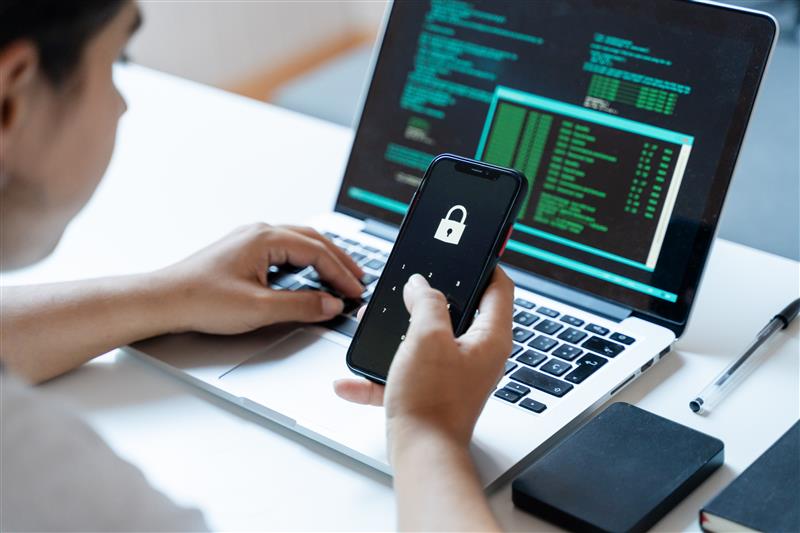If You’re Using ‘BeReal,’ You Should Be Really Careful

Have you heard about the latest social media craze, BeReal? Are you already using the app, testing the premise of whether it really brings authenticity back to social media? Maybe you just heard about it over the weekend from the SNL season premiere or earlier in September when Harry Styles found himself capturing a BeReal on stage. Either way, if you’re using BeReal now or contemplating downloading it, we’ve got a few security tips to keep in mind.
First, what is BeReal?
BeReal takes a new (or possibly returning to its’ roots) approach to social media with the goal of bringing authenticity back to social apps. As they state on their website, BeReal is, “A new and unique way to discover who your friends really are in their daily life.” Here’s how it works: Every day (and only once a day), at a different time, all users are notified simultaneously that it is ‘Time to BeReal.’

Notification message from BeReal.
From that alert, the clock begins counting down, and individuals have 2 minutes to capture what they are doing. Unique to BeReal is that the capture takes a picture with the front and back camera, highlighting yourself and your view in the post.

Example of a BeReal Post.
After you take your photos, it’s time to upload. First, you’ll select your audience as either "My friends only," or "Discovery," which is shared publicly on BeReal. From there, you’ll be able to see responses to your photo from your friends as well as see the BeReals that others posted that day.
Is BeReal the next TikTok or Clubhouse?
It’s difficult to predict which social media apps will last the test of time and which will fade as quickly as they ramp up. Let’s take TikTok and Clubhouse for example. TikTok, although initially launched in 2016, took off during the COVID-19 pandemic and now has over “one billion monthly active users.”
On the other hand, think about Clubhouse. Like TikTok, Clubhouse gained extreme popularity during the COVID-19 pandemic after launching in April 2020. Headlines read, “...The pandemic’s hottest new social media app,” on CNN.com. However, after seeing 10 million monthly downloads in February 2021, Clubhouse had less than 1 million downloads two months later.
5 Tips to stay safe on BeReal
Just like any other social media app, there are risks to sharing your information on the web. What connects us to friends and family as well as the greater world brings equal parts of community and risks. If you’re joining the BeReal trend, here are 5 things we hope you’ll consider:
1. Think about when you are being real
With BeReal, you’re not in control of when you get the notification. If you’re a school-aged individual, and BeReal goes off during class, consider not posting that day as the implications in real life can be consequential. For employees with strict social media guidelines in the workplace, the same goes for you. Although it may only be 2 minutes of your time, it’s not worth putting your job on the line.
2. Speaking of work...don’t be too real at work
Have you ever seen a post on a friend’s social media and zoomed in to see what’s going on in the background? You’re not alone. Curiosity gets the best of us and being real at work can get you into trouble. If BeReal goes off while you’re sitting at your desk, it might feel normal to take a picture of your monitors and yourself. But remember, the meetings in your calendar, the documents pulled up, the sticky notes on your desk could all contain bits of information that are confidential to your job.
3. Share with friends, not on "Discovery"
With each post, you can select the audience and we highly recommend you select friends only every time. Posting to Discovery has large privacy implications. After doing a deep dive into the BeReal API, Shomil Jain, a UC Berkeley student uncovered tremendous concerns with public posts. Jain discovered posts include the timestamp and the latitude and longitude of where the post was taken (precise to 1 meter!), and the owner ID, which can trace to a full name. It seems obvious but we’ll go ahead and write it, it’s not a good idea to share any of this information, one time or regularly, with the public.
4. Even private accounts share information publicly
If we could scream tip number 3 from the rooftops, we would but even if your account is only sharing with friends, there are still some concerns to the app. Jain continues in his article that, “it’s possible to discover the closest friends of pretty much every single user on this platform, including those that think they’re protecting their privacy by choosing to keep their posts private.” While seeing which users are connected to who might not seem concerning at first, combining this with the data exposed on “Discovery” posts can lead users to vulnerabilities.
5. Remember, social media isn’t always 'real' (even on BeReal!)
One of the biggest appeals to BeReal is that curation is seemingly not possible when you only have 2 minutes to snap a picture and you have no advance warning of when the alert will happen. While this may be the intent of the app, it’s not true for all users. 2 minutes is often enough time to frame the “perfect” photo and the app's ability to retake photos as many times (in the 2 minutes) as a member chooses, loses a bit of this authentic factor. So, if you’re going to BeReal, remember that it’s still social media.
Whether you’re on BeReal or not, chances are you have an online footprint spanning many other social platforms. IDShield can help you clean up your old social media posts, manage your settings and guide you through the steps you need to take to delete that account. Learn more about Reputation Management services and sign up for IDShield today to get started.
IDShield is a product of Pre-Paid Legal Services, Inc. (“PPLSI”) and provides access to identity theft protection and restoration services. IDShield plans are available at individual or family rates. A family plan covers the named member, named member’s spouse or domestic partner and eligible dependent children under the age of 18. For complete terms, coverage, and conditions, please see an identity theft plan. All Licensed Private Investigators are licensed in the state of Oklahoma. An Identity Fraud Protection Plan (“Plan”) is issued through a nationally recognized carrier. IDShield/PPLSI is not an insurance carrier. This covers certain fraud expenses and legal costs as a result of a covered identity fraud event. See a Plan for complete terms, coverage, conditions, limitations, and family members who are eligible under the Plan.



